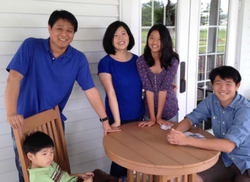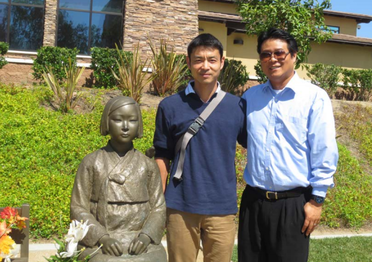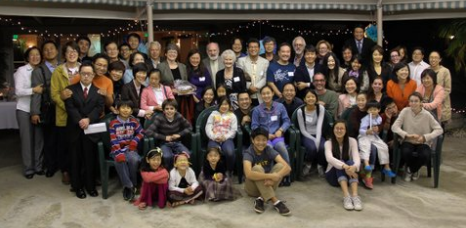 (clockwise) Hyun and Sue Hur with their children, Lynn, Guhn and Yul
(clockwise) Hyun and Sue Hur with their children, Lynn, Guhn and Yul Based on interview with co-founders, Sue & Hyun Hur
The concepts of peacemaking and conflict transformation were unfamiliar to Sue and Hyun Hur who grew up in traditional Christian churches within Korean communities – for Sue in the U.S. when she immigrated with her family as a child, and for Hyun who was part of the Korean Baptist Church in South Korea. The Hurs were drawn to shalom theology and its practical applications for the tensions surrounding them in their local community of Los Angeles, California. The more they learned about Anabaptism, the more they felt called to start a church with specific outreach to Korean immigrants and Korean Americans.
This proved difficult, however, because “Anabaptism” and “Mennonite” are not common concepts in Korean culture and any mention was met with suspicion and distrust. Because of ongoing tensions between North and South Korea, any group or organization that hints at a “peace movement” is suspect of being Communist and this was not working in the Hurs’ favor. They knew there was much they could offer their local Korean community in the way of conflict transformation; the challenge was to connect with people.
In 2012, the Hurs had the idea of offering seminars and workshops so Korean immigrants and Korean Americans could experience Mennonite theology and practical peacemaking skills firsthand. They partnered with Fuller Theological Seminary, knowing it would feel less threatening to host an event at a local venue versus their home-based church.
Bit by bit, the Hurs reached out and built trust, and as participants experienced the tangible effects of practicing peacemaking, the word spread. At the time, Hannah Heinzekehr was working with Mennonite Mission Network and learned what the Hurs were attempting to do with scarce funding. Together the Hurs, Heinzekehr, and Pacific Southwest Mennonite Conference worked to set up a support team that would raise funds for continuing this ministry. Because of limits in the process, this quickly led to the “official” founding of ReconciliAsian and becoming a 501(c)3 organization in 2013.
The concepts of peacemaking and conflict transformation were unfamiliar to Sue and Hyun Hur who grew up in traditional Christian churches within Korean communities – for Sue in the U.S. when she immigrated with her family as a child, and for Hyun who was part of the Korean Baptist Church in South Korea. The Hurs were drawn to shalom theology and its practical applications for the tensions surrounding them in their local community of Los Angeles, California. The more they learned about Anabaptism, the more they felt called to start a church with specific outreach to Korean immigrants and Korean Americans.
This proved difficult, however, because “Anabaptism” and “Mennonite” are not common concepts in Korean culture and any mention was met with suspicion and distrust. Because of ongoing tensions between North and South Korea, any group or organization that hints at a “peace movement” is suspect of being Communist and this was not working in the Hurs’ favor. They knew there was much they could offer their local Korean community in the way of conflict transformation; the challenge was to connect with people.
In 2012, the Hurs had the idea of offering seminars and workshops so Korean immigrants and Korean Americans could experience Mennonite theology and practical peacemaking skills firsthand. They partnered with Fuller Theological Seminary, knowing it would feel less threatening to host an event at a local venue versus their home-based church.
Bit by bit, the Hurs reached out and built trust, and as participants experienced the tangible effects of practicing peacemaking, the word spread. At the time, Hannah Heinzekehr was working with Mennonite Mission Network and learned what the Hurs were attempting to do with scarce funding. Together the Hurs, Heinzekehr, and Pacific Southwest Mennonite Conference worked to set up a support team that would raise funds for continuing this ministry. Because of limits in the process, this quickly led to the “official” founding of ReconciliAsian and becoming a 501(c)3 organization in 2013.
 Jun Nakai (left) and Hyun Hur (right) with comfort woman statue in Glendale, CA
Jun Nakai (left) and Hyun Hur (right) with comfort woman statue in Glendale, CA Naming the organization ReconciliAsian was very intentional – it opens conversation because it is an unusual word and not so “loaded”. This allows the Hurs to share about peace theology and conflict transformation in a non-threatening way. In turn, this has led to the Hurs sharing with others about the brokenness that happened in the Garden of Eden and how ever since, God has been about the work of restoration. They share that we are citizens of God’s kingdom – something that resonates with Korean immigrants and Korean Americans who are bi- and tri-cultural and are often trying to figure out where they belong.
The Hurs also observed that within the Korean community, church becomes the place where many find self-worth. Because Korean immigrants often come to the U.S. highly educated but unable to speak English, they are forced to take low-paying jobs. This can be a blow to self-esteem and since the church is the locus of the Korean community, it is here where many seek fulfillment and meaning – including self-worth. As a result, the Hurs witnessed power plays and conflicts ensuing around church roles. They knew Anabaptist principles of conflict transformation could help church members navigate these multi-dimensional conflicts and they began offering workshops to equip church members in this way.
The Hurs witness their outreach coming full circle – a hope they had from the very beginning. Their practice of peacemaking ripples from their marriage, to their family, to their house church, to ReconciliAsian, to the broader community and world.
Many Korean Americans and Korean immigrants are still living with the history and trauma of war. The Hurs feel called to equip their Korean community with the skills and tools to navigate conflict in transformative ways. This ripples out in navigating conflicts that can happen between the Korean community and other ethnic groups, as well as rippling out globally to conflicts in Northeast Asia.
As this reach spreads, ReconciliAsian workshop participants become curious about Anabaptist theology and the Mennonite Church. On more than one occasion, people have been surprised to learn the Hurs are Christian pastors because they do not match up with previous Christian encounters or experiences. This gives the Hurs the opportunity to share that there are many ways to follow Jesus, and they are choosing to follow the Prince of Peace as citizens of God’s kingdom.
To learn more about ReconciliAsian and to support this ministry online, visit ReconciliAsian.com.
Story Insert:
Seeking Shalom
As co-founders of ReconciliAsian, Sue and Hyun Hur are committed to sharing peacemaking skills and principles of conflict transformation with their local Korean community and beyond. So in the Spring of 2014, the Hurs gladly accepted an invitation to participate in a forum hosted by Duke University’s Divinity Center for Reconciliation.
At the forum, they met Jun Nakai, a Japanese Jesuit priest who was studying at Boston College. As he learned about the Hurs work with ReconciliAsian, he asked if he could study with them for a summer. The Hurs agreed and a summer of transformation unfolded for each of them.
As the trio got to know each other, Jun opened up about his journey in discovering the painful history of the “comfort women” – Korean, Filipino, and Chinese teenagers who were taken during World War II to “comfort” Japanese soldiers. Parents were told very little about what their daughters were being called to do, other than support and serve the war effort. The young women were subjected to the horrors of abuse and rape and because of a strong shame culture, they would return home unable to share what happened.
For the last twenty years, these comfort women – now in their 80’s – have come forward, speaking of what happened. The Japanese government denies there was any wrongdoing, saying everything that happened was voluntary.
As Jun shared his involvement in standing in solidarity with the comfort women, Hyun remembered the Glendale bronze statue created in memory of comfort women. There has been great controversy over the statue because the Japanese government wants it taken down. However, the statue remains as a reminder of the nightmarish history and as a vow to never let it happen again. The Hurs asked Jun if he would like to visit the statue.
When Jun, Sue and Hyun stood before the bronze comfort woman, it was an incredibly powerful moment. They stood in silence, particularly aware of their realities as a Japanese man and a Korean woman, standing together. Sadness overwhelmed them as they imagined these girls and all their unspoken stories.
Although their time before the statue was filled with pain, it was also filled with hope. The three talked together about their friendship and the hope that Jesus brings. This hope spilled over into the weekly peace study in Pasadena near Fuller Seminary. Jun joined the Hurs and other Koreans to study the Bible and learn more about shalom theology. He committed to learning Korean and speaking Korean which was very meaningful to the group. Sue shared that often the ideas of shalom and peace can feel so abstract, so out of reach. In the Summer of 2014, however, the three friends experienced the real-life ways that healing and peace can happen.
Ways you can support in prayer:
• Pray for peace in Northeast Asia.
• Pray for the Korean immigrants who are being sold the American Dream. Pray they are able to connect the dots and realize their unique position as immigrants who are multilingual with rich history – they can transcend the American Dream to something much greater as citizens of God's kingdom. Pray they embrace their identity and know who they are so shared stories can emerge and unite for peace.
• Pray for intercultural and interdenominational conflicts – that there can be openness across the differences and bridges of peace can be built.
• Pray that all those involved in this ministry can trust God more and as a result, rest more. When we trust God, we can have Sabbath. We tend to work too much, relying on our own strengths, but when we trust God, we can rest.
• Pray for people who can come alongside the ReconciliAsian team and join in peacemaking work. God continues to provide despite very limited funding, but it gets lonely at times. The Hurs would welcome sojourners in this ministry.
The Hurs also observed that within the Korean community, church becomes the place where many find self-worth. Because Korean immigrants often come to the U.S. highly educated but unable to speak English, they are forced to take low-paying jobs. This can be a blow to self-esteem and since the church is the locus of the Korean community, it is here where many seek fulfillment and meaning – including self-worth. As a result, the Hurs witnessed power plays and conflicts ensuing around church roles. They knew Anabaptist principles of conflict transformation could help church members navigate these multi-dimensional conflicts and they began offering workshops to equip church members in this way.
The Hurs witness their outreach coming full circle – a hope they had from the very beginning. Their practice of peacemaking ripples from their marriage, to their family, to their house church, to ReconciliAsian, to the broader community and world.
Many Korean Americans and Korean immigrants are still living with the history and trauma of war. The Hurs feel called to equip their Korean community with the skills and tools to navigate conflict in transformative ways. This ripples out in navigating conflicts that can happen between the Korean community and other ethnic groups, as well as rippling out globally to conflicts in Northeast Asia.
As this reach spreads, ReconciliAsian workshop participants become curious about Anabaptist theology and the Mennonite Church. On more than one occasion, people have been surprised to learn the Hurs are Christian pastors because they do not match up with previous Christian encounters or experiences. This gives the Hurs the opportunity to share that there are many ways to follow Jesus, and they are choosing to follow the Prince of Peace as citizens of God’s kingdom.
To learn more about ReconciliAsian and to support this ministry online, visit ReconciliAsian.com.
Story Insert:
Seeking Shalom
As co-founders of ReconciliAsian, Sue and Hyun Hur are committed to sharing peacemaking skills and principles of conflict transformation with their local Korean community and beyond. So in the Spring of 2014, the Hurs gladly accepted an invitation to participate in a forum hosted by Duke University’s Divinity Center for Reconciliation.
At the forum, they met Jun Nakai, a Japanese Jesuit priest who was studying at Boston College. As he learned about the Hurs work with ReconciliAsian, he asked if he could study with them for a summer. The Hurs agreed and a summer of transformation unfolded for each of them.
As the trio got to know each other, Jun opened up about his journey in discovering the painful history of the “comfort women” – Korean, Filipino, and Chinese teenagers who were taken during World War II to “comfort” Japanese soldiers. Parents were told very little about what their daughters were being called to do, other than support and serve the war effort. The young women were subjected to the horrors of abuse and rape and because of a strong shame culture, they would return home unable to share what happened.
For the last twenty years, these comfort women – now in their 80’s – have come forward, speaking of what happened. The Japanese government denies there was any wrongdoing, saying everything that happened was voluntary.
As Jun shared his involvement in standing in solidarity with the comfort women, Hyun remembered the Glendale bronze statue created in memory of comfort women. There has been great controversy over the statue because the Japanese government wants it taken down. However, the statue remains as a reminder of the nightmarish history and as a vow to never let it happen again. The Hurs asked Jun if he would like to visit the statue.
When Jun, Sue and Hyun stood before the bronze comfort woman, it was an incredibly powerful moment. They stood in silence, particularly aware of their realities as a Japanese man and a Korean woman, standing together. Sadness overwhelmed them as they imagined these girls and all their unspoken stories.
Although their time before the statue was filled with pain, it was also filled with hope. The three talked together about their friendship and the hope that Jesus brings. This hope spilled over into the weekly peace study in Pasadena near Fuller Seminary. Jun joined the Hurs and other Koreans to study the Bible and learn more about shalom theology. He committed to learning Korean and speaking Korean which was very meaningful to the group. Sue shared that often the ideas of shalom and peace can feel so abstract, so out of reach. In the Summer of 2014, however, the three friends experienced the real-life ways that healing and peace can happen.
Ways you can support in prayer:
• Pray for peace in Northeast Asia.
• Pray for the Korean immigrants who are being sold the American Dream. Pray they are able to connect the dots and realize their unique position as immigrants who are multilingual with rich history – they can transcend the American Dream to something much greater as citizens of God's kingdom. Pray they embrace their identity and know who they are so shared stories can emerge and unite for peace.
• Pray for intercultural and interdenominational conflicts – that there can be openness across the differences and bridges of peace can be built.
• Pray that all those involved in this ministry can trust God more and as a result, rest more. When we trust God, we can have Sabbath. We tend to work too much, relying on our own strengths, but when we trust God, we can rest.
• Pray for people who can come alongside the ReconciliAsian team and join in peacemaking work. God continues to provide despite very limited funding, but it gets lonely at times. The Hurs would welcome sojourners in this ministry.


 RSS Feed
RSS Feed
